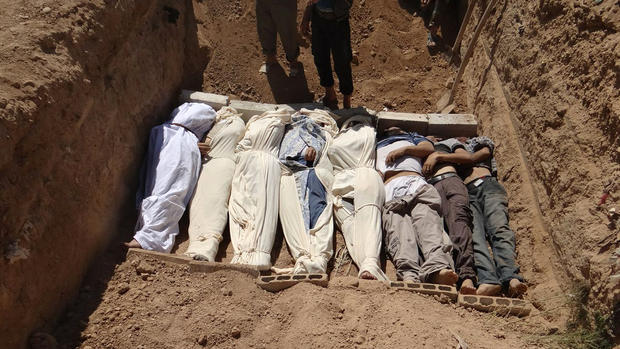Syria to miss chemical weapons deadline
UNITED NATIONS -- Secretary-General Ban Ki-moon has informed the U.N. Security Council that the June 30 deadline for totally eliminating Syria's chemical weapons will not be met because the Syrian government says the final shipment of dangerous chemicals can't be transported safely.
The U.N. chief said in a letter obtained Wednesday by The Associated Press that 7.2 percent of Syria's declared chemical stockpile remains in the country. He said the government insists it doesn't fully control security in the area where the chemical agents are stored and has "serious concerns about the safety and security" of convoys that will transport the material to the port of Latakia.
"It is imperative that the Syrian Arab Republic concludes remaining removal operations as quickly as possible, as the authorities have pledged to do," Ban said. "However, it is now evident that some activities related to the elimination of the chemical weapons program of the Syrian Arab Republic will continue beyond June 30, 2014."
The international community, shocked by a chemical attack last August that killed hundreds near Damascus, had aimed to remove and destroy 1,300 metric tons of chemicals by June 30. The August attack was blamed on the government of Syrian President Bashar Assad, which denied involvement.
The 100 metric tons still in Syria are at a storage facility near the capital, Damascus. Ahmet Uzumcu, who heads the Organization for the Prohibition of Chemical Weapons (OPCW), says the chemicals, including raw materials for making the deadly nerve agent sarin, have been packaged and are ready for transport to Latakia.
Under an agreement brokered by the United States and Russia to eliminate Syria's chemical weapons, the government is responsible for getting the most dangerous chemicals to the port, and destroying the rest inside the country. Syria missed several deadlines, including a final April 27 deadline to get all dangerous chemical out of the country.
U.S. Secretary of Defense Chuck Hagel told CBS News earlier this month that it was possible the Assad regime could use the chemical weapons agents still in the country in a new attack, and said there was also concern the Syrians had not completely destroyed their capability to produce new chemical weapons.
The Obama administration's own representative to the OPCW, Robert Mikulak, said in an open letter to the organization's chairman that the U.S. government believed Syria intentionally omitted a number of "underground structures" that are directly related to chemical weapons production from their destruction plans under the deal.
Mukulak also accused the Assad regime of "dragging its feet" in abiding by the U.N. resolution's terms, challenging the notion that security was a primary impediment to securing the remaining chemical weapons materials.
The U.S. representative's letter also said "information continues to accumulate" that "toxic chemicals have been used as chemical weapons" more recently in the civil war, a reference to recent allegations of chlorine gas attacks.
The most toxic chemicals are being put on Danish and Norwegian cargo ships at Latakia. Once the final 100 tons are loaded, the cargo ships will sail to the Italian port of Gioia Tauro where the chemical containers will be transferred to an American ship, MV Cape Ray, which is equipped with two machines that will render them inert.
It has been clear for several months that the June 30 deadline would almost certainly not be met, because of Syria's delays and the 60 days needed for the Cape Ray to neutralize the chemicals.
Ban said there is other unfinished business in addition to the removal of the last chemical agents: Syria and the OPCW are still discussing how to destroy 12 chemical production facilities, one item of loading equipment at one facility, and one building at another.
The Security Council is scheduled to be briefed next week by Sigrid Kaag, head of the joint mission, and U.N. diplomats say some type of follow-on is expected be discussed.
